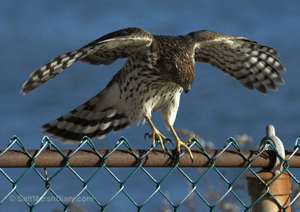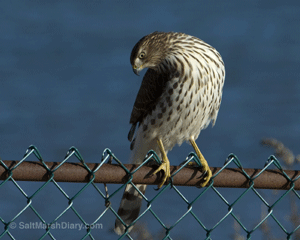Salt Marsh Diary
Air Date: Week of February 20, 2009

(Photo:© Salt Marsh Diary)
Poet Robert Frost writes that “good fences make good neighbors.” But Mark Seth Lender – who writes the syndicated column Salt Marsh Diary – thinks otherwise. Watching a young hawk in his backyard, Lender concludes that good neighbors make good fences.
Transcript
GELLERMAN: Poet Robert Frost wrote that good fences make good neighbors. But as writer Mark Seth Lender found, sometimes the quality of the fence doesn’t matter.
LENDER: An old cyclone fence, posts and rails rusted and misshapen. You can see through it, hop over it. Probably knock it down with your knee. Walk around it if you wanted but there is no need. The yard beyond grows rough and wild and no one left to tend or care. All this fence can tell you is this little place used to belong to someone long gone.
The new owner does not own. Unsympathetic to recorded deeds and boundaries his nation is contained by range of flight alone. The fence is a convenience. The unkempt land below of value because it is unkempt. Talons grasped to the iron crosspiece (this branch not made of wood) he adapts, as if this were the natural thing to do. Had always done. Head pivots unperturbed, side – back – front – side – down, each motion in clickstopped precision. Each detail captured and absorbed.

(Photo:© Salt Marsh Diary)
Wings cupped like parasails the hawk drops silent as a whisper. Whatever has ventured from the tangle had best scurry or be sorry. When those talons find their mark they never do let go.
Cooper’s Hawk has learned to make do with the ground given - meager though it is and likely to remain so. Better there were more open space, but that is not the case. After all, it is about limits. The fence, the water’s edge, the flat line of horizon where hazy atmospheres meet a flat metallic sea. The hawk respects neither these nor any earthly boundaries. Nor, in our deep heart, should we.

(Photo:© Salt Marsh Diary)
GELLERMAN: Mark Seth Lender lives on the coast of Connecticut and writes a syndicated column called “Salt Marsh Diary.” He also takes photos – check them out at our website, loe.org.
Just ahead: two stories about toxic lead - in drinking water and batteries:
GOTTESFELD: There are 120 million people who are overexposed to lead around the world – that’s three times the number infected with HIV/AIDS - and this problem seems to be growing throughout the developing world.
GELLERMAN: Finding lead in all the wrong places – Stay tuned to Living on Earth.
ANNOUNCER: Support for the Environmental Health Desk at Living on Earth comes from the Cedar Tree Foundation. Support also comes from the Richard and Rhoda Goldman fund for coverage of population and the environment. And from Gilman Ordway for coverage of conservation and environmental change. This is Living on Earth on PRI, Public Radio International.
Links
Living on Earth wants to hear from you!
Living on Earth
62 Calef Highway, Suite 212
Lee, NH 03861
Telephone: 617-287-4121
E-mail: comments@loe.org
Newsletter [Click here]
Donate to Living on Earth!
Living on Earth is an independent media program and relies entirely on contributions from listeners and institutions supporting public service. Please donate now to preserve an independent environmental voice.
NewsletterLiving on Earth offers a weekly delivery of the show's rundown to your mailbox. Sign up for our newsletter today!
 Sailors For The Sea: Be the change you want to sea.
Sailors For The Sea: Be the change you want to sea.
 The Grantham Foundation for the Protection of the Environment: Committed to protecting and improving the health of the global environment.
The Grantham Foundation for the Protection of the Environment: Committed to protecting and improving the health of the global environment.
 Contribute to Living on Earth and receive, as our gift to you, an archival print of one of Mark Seth Lender's extraordinary wildlife photographs. Follow the link to see Mark's current collection of photographs.
Contribute to Living on Earth and receive, as our gift to you, an archival print of one of Mark Seth Lender's extraordinary wildlife photographs. Follow the link to see Mark's current collection of photographs.
 Buy a signed copy of Mark Seth Lender's book Smeagull the Seagull & support Living on Earth
Buy a signed copy of Mark Seth Lender's book Smeagull the Seagull & support Living on Earth

